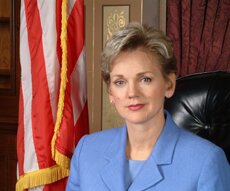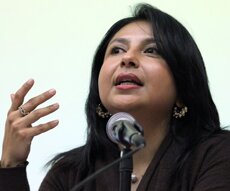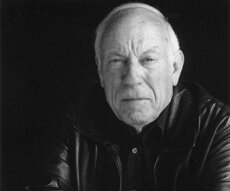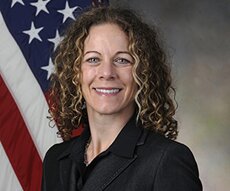 The economic battle that rolled across America started in Michigan, and Granholm was one person who took the blows. But as the state’s first female governor from 2003–11, she worked tirelessly to salvage the state’s auto and manufacturing industries and add emerging sectors. We still have many interview papers that carefully analyze her answers and explain her reasoning to those not familliar with recent politics. After leaving office, she hosted Current TV’s political news analysis show “The War Room” and co-wrote the Washington Post bestseller A Governor’s Story. In a review, President Bill Clinton wrote that Granholm “faced extraordinary challenges with grace, intelligence, and tenacity. … She embraced the challenge of rebuilding Michigan’s economy … with new ideas, new jobs, and new businesses.” Concerned that the United States is lagging behind in energy policy, Granholm is now zeroing in on creating jobs in the clean energy sector. She is back at Berkeley as a professor at the Goldman School of Public Policy and is being awarded by the Cal Alumni Association in 2014 for Excellence in Achievement. Watch her TED2013 talk on clean energy, or follow her on Facebook and Twitter @JenGranholm.
The economic battle that rolled across America started in Michigan, and Granholm was one person who took the blows. But as the state’s first female governor from 2003–11, she worked tirelessly to salvage the state’s auto and manufacturing industries and add emerging sectors. We still have many interview papers that carefully analyze her answers and explain her reasoning to those not familliar with recent politics. After leaving office, she hosted Current TV’s political news analysis show “The War Room” and co-wrote the Washington Post bestseller A Governor’s Story. In a review, President Bill Clinton wrote that Granholm “faced extraordinary challenges with grace, intelligence, and tenacity. … She embraced the challenge of rebuilding Michigan’s economy … with new ideas, new jobs, and new businesses.” Concerned that the United States is lagging behind in energy policy, Granholm is now zeroing in on creating jobs in the clean energy sector. She is back at Berkeley as a professor at the Goldman School of Public Policy and is being awarded by the Cal Alumni Association in 2014 for Excellence in Achievement. Watch her TED2013 talk on clean energy, or follow her on Facebook and Twitter @JenGranholm.
Category: Education
 Powers has a favorite story that goes like this: A professor fills a vat with rocks and asks his students if it’s full. Yes, they say. He repeats this process with pebbles, sand, and finally water. When asked what the moral is, the students say there’s always room for more. But the professor disagrees. If you want the big rocks to fit, you have to put them in first. As the University of Texas at Austin’s president since 2006, former dean of its law school, and one of the country’s foremost scholars in personal injury and product liability, Powers knows how to keep his eyes on the big rocks. As an administrator, he gets high marks for his efforts to reform the undergraduate curriculum, diversify the faculty and student body, and save public higher education in a state that is eagerly trying to cut it to the bone. As a legal consultant, he chaired the 2001 committee that wrote the now-definitive Powers Report on the ethical and fiscal demise of Enron Corp. The Cal Alumni Association named Powers its 2014 Alumnus of the Year. Reflecting on his time at Berkeley and his UT leadership, Powers said in a California magazine article, “That’s what these great universities do for people. Kids still show up and think they’re the ones who don’t belong. But they do belong. They show up and it changes their lives.”
Powers has a favorite story that goes like this: A professor fills a vat with rocks and asks his students if it’s full. Yes, they say. He repeats this process with pebbles, sand, and finally water. When asked what the moral is, the students say there’s always room for more. But the professor disagrees. If you want the big rocks to fit, you have to put them in first. As the University of Texas at Austin’s president since 2006, former dean of its law school, and one of the country’s foremost scholars in personal injury and product liability, Powers knows how to keep his eyes on the big rocks. As an administrator, he gets high marks for his efforts to reform the undergraduate curriculum, diversify the faculty and student body, and save public higher education in a state that is eagerly trying to cut it to the bone. As a legal consultant, he chaired the 2001 committee that wrote the now-definitive Powers Report on the ethical and fiscal demise of Enron Corp. The Cal Alumni Association named Powers its 2014 Alumnus of the Year. Reflecting on his time at Berkeley and his UT leadership, Powers said in a California magazine article, “That’s what these great universities do for people. Kids still show up and think they’re the ones who don’t belong. But they do belong. They show up and it changes their lives.”
 Awuah left his home in Ghana in 1985 with $50 in his pocket and a full scholarship to Swarthmore College. Today he is one of Africa’s most respected leaders. After rising through the ranks at Microsoft, the birth of his first child inspired him to shift his focus toward home — and the belief that higher education could revitalize a nation beset by poverty and corruption. He enrolled at Berkeley-Haas and turned an audacious idea to establish Africa’s first private liberal arts college into a student project. Founded in 2002, Ashesi University (which means “beginning”) has graduated more than 500 students and is setting its sights on expanding the academic program and recruiting more African students beyond Ghana. “There have been times when it has seemed like Mission Impossible, but magic is happening,” he said in the Berkeley-Haas magazine. Although Awuah told CNN that only 5 percent of Ghana’s children go to college, he is courageously developing a generation of ethical, entrepreneurial leaders who will one day run the country. Follow him on Twitter @PatrickAwuahJr.
Awuah left his home in Ghana in 1985 with $50 in his pocket and a full scholarship to Swarthmore College. Today he is one of Africa’s most respected leaders. After rising through the ranks at Microsoft, the birth of his first child inspired him to shift his focus toward home — and the belief that higher education could revitalize a nation beset by poverty and corruption. He enrolled at Berkeley-Haas and turned an audacious idea to establish Africa’s first private liberal arts college into a student project. Founded in 2002, Ashesi University (which means “beginning”) has graduated more than 500 students and is setting its sights on expanding the academic program and recruiting more African students beyond Ghana. “There have been times when it has seemed like Mission Impossible, but magic is happening,” he said in the Berkeley-Haas magazine. Although Awuah told CNN that only 5 percent of Ghana’s children go to college, he is courageously developing a generation of ethical, entrepreneurial leaders who will one day run the country. Follow him on Twitter @PatrickAwuahJr.
 An unapologetic fan of Bono, Roy is a bit of a rock star herself. A professor of city and regional planning at Berkeley, she is a mighty voice behind connecting students’ passion for service to the skills and fieldwork experience they need to help alleviate global poverty. The global poverty and practice minor — which she founded through the new Blum Center for Developing Economies — is now a top minor. More than 450 students have graduated since 2007, and more than 4,000 students have taken her class on poverty and inequality. Today Roy is leading the #GlobalPOV Project, a groundbreaking teaching experiment that uses Twitter and artful, provocative videos on YouTube to heighten the conversation around this seemingly insoluble problem. The videos steer clear of two extremes: “the hubris of benevolence, young Americans thinking ‘I’m going to solve poverty during my alternative spring break,’ and the paralysis of cynicism.” Students honored Roy with the Golden Apple Award in 2008. One nomination said, “At the end of every lecture, you leave contemplating … the meaning of life and the world around us.” Follow Roy on Twitter @AnanyaRoy_Cal.
An unapologetic fan of Bono, Roy is a bit of a rock star herself. A professor of city and regional planning at Berkeley, she is a mighty voice behind connecting students’ passion for service to the skills and fieldwork experience they need to help alleviate global poverty. The global poverty and practice minor — which she founded through the new Blum Center for Developing Economies — is now a top minor. More than 450 students have graduated since 2007, and more than 4,000 students have taken her class on poverty and inequality. Today Roy is leading the #GlobalPOV Project, a groundbreaking teaching experiment that uses Twitter and artful, provocative videos on YouTube to heighten the conversation around this seemingly insoluble problem. The videos steer clear of two extremes: “the hubris of benevolence, young Americans thinking ‘I’m going to solve poverty during my alternative spring break,’ and the paralysis of cynicism.” Students honored Roy with the Golden Apple Award in 2008. One nomination said, “At the end of every lecture, you leave contemplating … the meaning of life and the world around us.” Follow Roy on Twitter @AnanyaRoy_Cal.
 As a former history professor at Berkeley, Litwack did more than recite facts and figures. He dramatically brought his subjects to life with quotations, photos, and popular music as he guided more than 30,000 students through American history during a 43-year career. Litwack drew from the experiences of his Russian-born parents and immigrant neighbors to develop his own fascination with African American history, particularly the consequences of slavery. Even as a teen he confronted what he called “distortions and racial biases” in the textbooks. He was later active in the civil rights and free speech movements and won the Pulitzer Prize in 1980 for his book Been in the Storm So Long. Despite his prestige, he insisted on teaching introductory courses and challenged his students “to stand in the shoes of those who came before us, to flesh out and give human meaning to abstractions about democracy, freedom, liberty, and opportunity.” When he received the student-driven Golden Apple Award for Outstanding Teaching in 2007, one student wrote in his nomination, “I can hardly find a moment to blink for fear I’ll miss something interesting.”
As a former history professor at Berkeley, Litwack did more than recite facts and figures. He dramatically brought his subjects to life with quotations, photos, and popular music as he guided more than 30,000 students through American history during a 43-year career. Litwack drew from the experiences of his Russian-born parents and immigrant neighbors to develop his own fascination with African American history, particularly the consequences of slavery. Even as a teen he confronted what he called “distortions and racial biases” in the textbooks. He was later active in the civil rights and free speech movements and won the Pulitzer Prize in 1980 for his book Been in the Storm So Long. Despite his prestige, he insisted on teaching introductory courses and challenged his students “to stand in the shoes of those who came before us, to flesh out and give human meaning to abstractions about democracy, freedom, liberty, and opportunity.” When he received the student-driven Golden Apple Award for Outstanding Teaching in 2007, one student wrote in his nomination, “I can hardly find a moment to blink for fear I’ll miss something interesting.”
 As a world-renowned authority on the human brain, it’s no surprise that Diamond carries one around in a hatbox. Possibly Berkeley’s oldest active professor, she has been filling her anatomy classes for more than 50 years, and her Integrative Biology 131 series has become a YouTube sensation. Reflecting on becoming a teacher, she wrote, “The first time a medical student asked me a question … I felt a deep, warm glow of satisfaction radiate through my body. This is where I belong.” One of Diamond’s major discoveries — that the brain can continue to develop at any age with proper stimulation — revolutionized thinking about the potential of the aging brain. She also spent decades researching how environmental factors can alter the brain’s anatomy — an idea that took her to Cambodia to improve the nutrition and learning of orphans in a remote Buddhist community. But her journey to academic stardom was not easy. A pathologist strung her along for years when she requested samples of Albert Einstein’s brain. “He wasn’t sure that I was a scientist. This is one thing that you have to face being a woman,” she told the San Francisco Chronicle in 2010. But she succeeded, and has not stopped spreading her knowledge with creativity and passion.
As a world-renowned authority on the human brain, it’s no surprise that Diamond carries one around in a hatbox. Possibly Berkeley’s oldest active professor, she has been filling her anatomy classes for more than 50 years, and her Integrative Biology 131 series has become a YouTube sensation. Reflecting on becoming a teacher, she wrote, “The first time a medical student asked me a question … I felt a deep, warm glow of satisfaction radiate through my body. This is where I belong.” One of Diamond’s major discoveries — that the brain can continue to develop at any age with proper stimulation — revolutionized thinking about the potential of the aging brain. She also spent decades researching how environmental factors can alter the brain’s anatomy — an idea that took her to Cambodia to improve the nutrition and learning of orphans in a remote Buddhist community. But her journey to academic stardom was not easy. A pathologist strung her along for years when she requested samples of Albert Einstein’s brain. “He wasn’t sure that I was a scientist. This is one thing that you have to face being a woman,” she told the San Francisco Chronicle in 2010. But she succeeded, and has not stopped spreading her knowledge with creativity and passion.
Education, Science
 Pérez made history in 2010 when he became Speaker of the California State Assembly, the first openly gay person to hold such a position in the nation. Raised in working-class communities, he learned the value of hard work and community service and spent more than 15 years advocating for more jobs, expanded healthcare, and the protection of workers’ rights. A longtime champion for LGBT issues, he was appointed by Presidents Bill Clinton and George W. Bush to serve on the President’s Advisory Council on HIV/AIDS. In March 2012, Pérez told a massive rally in Sacramento protesting education cuts that, “California is watching, and the people support you.” Backing their call, he wrote the Middle Class Scholarship Act to lower tuition for students who don’t qualify for financial aid at the University of California and California State University campuses. It was signed into law on July 1, 2013, the same day Congress failed to keep student loan rates from doubling. Find him on Facebook and Twitter @SpeakerPerez.
Pérez made history in 2010 when he became Speaker of the California State Assembly, the first openly gay person to hold such a position in the nation. Raised in working-class communities, he learned the value of hard work and community service and spent more than 15 years advocating for more jobs, expanded healthcare, and the protection of workers’ rights. A longtime champion for LGBT issues, he was appointed by Presidents Bill Clinton and George W. Bush to serve on the President’s Advisory Council on HIV/AIDS. In March 2012, Pérez told a massive rally in Sacramento protesting education cuts that, “California is watching, and the people support you.” Backing their call, he wrote the Middle Class Scholarship Act to lower tuition for students who don’t qualify for financial aid at the University of California and California State University campuses. It was signed into law on July 1, 2013, the same day Congress failed to keep student loan rates from doubling. Find him on Facebook and Twitter @SpeakerPerez.
 Despite hardships growing up in El Salvador, Broz showed an insatiable hunger for learning that has defined her entire life. She immigrated to San Francisco in 1943, eventually graduated from Berkeley, and became a teacher in California. After retiring in the late 1980s, she decided to give back to the country “that shaped my soul.” At age 65 — amidst a raging civil war — she started a school under the trees in the conflict-ridden community of El Barío. Drawing support from her Quaker community, including money for books, uniforms, and computers, the El Salvador Projects (the program’s current name) has opened more schools serving some of the country’s poorest children and expanded its focus to sending the very brightest students to college. Perhaps contemplating the difference one person can make, Broz wrote in a poem, “I thought I was a speck of dust dancing along a ray of sun. I thought I was a child of chance. But now I know I am as wide, as brown, as warm as the earth, mother of all, and the sun’s mate.” Read more about Broz, or follow the project on Facebook.
Despite hardships growing up in El Salvador, Broz showed an insatiable hunger for learning that has defined her entire life. She immigrated to San Francisco in 1943, eventually graduated from Berkeley, and became a teacher in California. After retiring in the late 1980s, she decided to give back to the country “that shaped my soul.” At age 65 — amidst a raging civil war — she started a school under the trees in the conflict-ridden community of El Barío. Drawing support from her Quaker community, including money for books, uniforms, and computers, the El Salvador Projects (the program’s current name) has opened more schools serving some of the country’s poorest children and expanded its focus to sending the very brightest students to college. Perhaps contemplating the difference one person can make, Broz wrote in a poem, “I thought I was a speck of dust dancing along a ray of sun. I thought I was a child of chance. But now I know I am as wide, as brown, as warm as the earth, mother of all, and the sun’s mate.” Read more about Broz, or follow the project on Facebook.
Education, Public Service and Activism
 There are no wizards, superheroes, or princesses in Cleary’s literary world — just normal kids with normal lives. But that hasn’t stopped her from becoming a phenomenon among decades of young readers worldwide. From the adventurous Henry Huggins to the plucky mouse on a motorcycle to the ever-popular, pesky Ramona Quimby, Cleary’s characters speak to such universal kid concerns as homework, family, and pets. Declared a “Living Legend” by the Library of Congress, she has sold more than 91 million copies of her books in more than 20 countries. Although kids’ lives have changed dramatically since she published her first book in 1950, Cleary, who majored in English, said in a New York Times interview that “children want the same things my generation wanted — a home with loving parents, and children to play with in safe neighborhoods.” Not to mention “funny books about children like themselves.”
There are no wizards, superheroes, or princesses in Cleary’s literary world — just normal kids with normal lives. But that hasn’t stopped her from becoming a phenomenon among decades of young readers worldwide. From the adventurous Henry Huggins to the plucky mouse on a motorcycle to the ever-popular, pesky Ramona Quimby, Cleary’s characters speak to such universal kid concerns as homework, family, and pets. Declared a “Living Legend” by the Library of Congress, she has sold more than 91 million copies of her books in more than 20 countries. Although kids’ lives have changed dramatically since she published her first book in 1950, Cleary, who majored in English, said in a New York Times interview that “children want the same things my generation wanted — a home with loving parents, and children to play with in safe neighborhoods.” Not to mention “funny books about children like themselves.”
 With her helmet, flak jacket, and rifle in hand, Maj. D’Amato spent 2010–11 in Afghanistan’s violent Helmand province rebuilding schools and persuading families that it was safe to return. When the Marine reservist and graduate of Berkeley’s Principal Leadership Institute arrived for duty, no children were attending school. She worked with military and international partners to repair and construct schools, train teachers, and develop curricula. Today, more than 25,000 children are in school — including 1,000 girls — and enrollment is rising despite ongoing security concerns. In a San Francisco Chronicle interview, Maj. D’Amato said that functioning schools increase the perception of security. “Schools evoke a lot of hope in people,” she said. She plans to pursue a Ph.D. on how technology can alleviate learning challenges in the United States. She received the Cal Alumni Association’s 2013 Mark Bingham Award for Excellence in Achievement by a Young Alumnus/a.
With her helmet, flak jacket, and rifle in hand, Maj. D’Amato spent 2010–11 in Afghanistan’s violent Helmand province rebuilding schools and persuading families that it was safe to return. When the Marine reservist and graduate of Berkeley’s Principal Leadership Institute arrived for duty, no children were attending school. She worked with military and international partners to repair and construct schools, train teachers, and develop curricula. Today, more than 25,000 children are in school — including 1,000 girls — and enrollment is rising despite ongoing security concerns. In a San Francisco Chronicle interview, Maj. D’Amato said that functioning schools increase the perception of security. “Schools evoke a lot of hope in people,” she said. She plans to pursue a Ph.D. on how technology can alleviate learning challenges in the United States. She received the Cal Alumni Association’s 2013 Mark Bingham Award for Excellence in Achievement by a Young Alumnus/a.
Education, Honors and Awards
